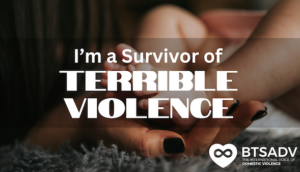By Joanna Kopic
Anxiety is often misunderstood as a sign of emotional instability or personal weakness. In reality, for many survivors of domestic violence, anxiety is not only natural, it’s a deeply ingrained survival response.
Far from being a flaw, it’s the brain’s way of protecting the individual in the face of past or ongoing danger.
How Anxiety Affects Survivors
Survivors of domestic violence often endure prolonged periods of unpredictability, emotional manipulation, physical harm, and psychological distress.
The nervous system, particularly the brain’s amygdala, responsible for detecting threats, can become hypersensitive during and after trauma.
According to the National Center for PTSD, repeated exposure to traumatic experiences can cause the brain to remain in a state of hyper-arousal. Making it difficult for survivors to feel truly safe.
Even when the threat has passed (U.S. Department of Veterans Affairs, 2021).
Hyper-Vigilance
This heightened state of vigilance often manifests as chronic anxiety. Racing thoughts, hyper-vigilance, panic attacks, and a persistent sense of dread.
While these symptoms can feel debilitating, they are evidence of the brain’s remarkable ability to adapt for survival.
“Trauma rewires the brain to stay in a constant state of alertness,” says Dr. Bessel Van Der Kolk, author of The Body Keeps the Score. “For survivors, being anxious isn’t overreacting—it’s their body remembering how to stay alive.”
Reframing Anxiety
It’s important to reframe anxiety not as a disorder in these cases, but as a contextual response to past danger. The Anxiety and Depression Association of America (ADAA) notes that individuals with a trauma history often experience anxiety disorders at higher rates than the general population.
This is precisely because their bodies have learned to anticipate threat in order to survive (ADAA, 2023).
Labeling anxiety as weakness only reinforces shame and discourages survivors from seeking support.
Instead, validating their experiences and recognizing anxiety as an intelligent response to prolonged trauma can empower healing. Survivors are not broken—they are resilient, having endured experiences that required them to remain on high alert for long periods of time.
Recovery and Retraining Trauma Responses
Recovery often involves retraining the nervous system to recognize safety again. This can be achieved through trauma-informed therapy modalities such as EMDR (Eye Movement Desensitization and Reprocessing). Also somatic experiencing, and cognitive behavioral therapy (CBT). All of which have been shown to help reduce trauma-related anxiety (National Institute of Mental Health, 2022).
Ultimately, anxiety in survivors of domestic violence should be seen as a signal. Not of weakness, but of strength.
It reflects the body’s powerful instinct to survive, to adapt, and to protect. Recognizing this truth is not only a step toward compassion and understanding but also a path to meaningful healing.
Sources:
- U.S. Department of Veterans Affairs. (2021). Understanding PTSD and PTSD Treatment. National Center for PTSD.
- van der Kolk, B. (2014). The Body Keeps the Score: Brain, Mind, and Body in the Healing of Trauma.
- Anxiety and Depression Association of America (ADAA). (2023). Trauma and Anxiety.
- National Institute of Mental Health (NIMH). (2022). Post-Traumatic Stress Disorder (PTSD).
Check These Resources:
- Therapeutic Interventions for Healing From Domestic Violence
- The Hidden Impact of Teen Dating Violence
- Find Support with BTSADV
Support Line
Other Resources and Information:



